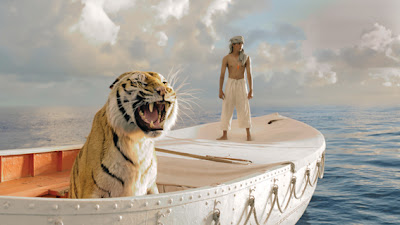Django Unchained. Rated MA 15+ (strong bloody violence and themes). 165 minutes. Written and directed by Quentin Tarantino.
Verdict: A brilliant cast brings Tarantino’s provocative
southern adventure to life in high style.
This latest film in
Tarantino’s career-long study of the grand theme of revenge is an
extraordinarily complicated beast that can be appreciated on a number of
levels. Beautifully shot by Tarantino’s (and Oliver Stone’s) frequent
collaborator, cinematographer Robert Richardson, Tarantino’s finely-wrought
screenplay combines wit, humour, passion, chance and the thrill of the tasks at
hand perfectly.
Django Unchained can just as easily be dismissed as a gruesome
pantomime from a bygone era that requires us to ignore just how much has
changed about the way African Americans are portrayed in contemporary cinema.
Either way, there is little doubt that Tarantino is an exceptional provocateur
– but if Django Unchained is
remembered for anything in years to come, it will be for the fearless
performances from his exceptionally committed cast.
When the slave Django
Freeman (Jamie Foxx) is purchased by bounty hunter Dr King Schultz (Christoph
Waltz), the pair agree that if Django can help Schultz track down the evil Brittle
brothers, he will help Django find and rescue his wife Broomhilda (Kerry
Washington) who is a slave to the ruthless plantation owner Calvin Candie
(Leonardo DiCaprio). As the tense negotiations for Broomhilda’s freedom reach a
mutually-agreeable conclusion, Candie’s loyal slave Stephen (Samuel L. Jackson)
realises that Django and Broomhilda mean more to each other than either have
let on, and the price for her freedom becomes almost insurmountable.
Built on impossibly high
stakes and played in a perfectly-matched style, Tarantino’s vision has been
well-served by his brilliant cast who are all at the very top of their games.
DiCaprio and Jackson both shed whatever previous association we may have had
with them as actors like skin and escort their characters to extreme levels of
perversity – with Jackson’s scenes with a shackled, strung upside-down Foxx
among the film’s most challenging. Waltz (in a companion piece to his memorable
performance in Tarantino’s Inglorious Basterds) is mesmerising as Schultz – whose fascinating
journey through the film is the one that captures our imagination and refuses
to let us go unmoved.
This review was commissioned by the Geraldton Newspaper Group.


